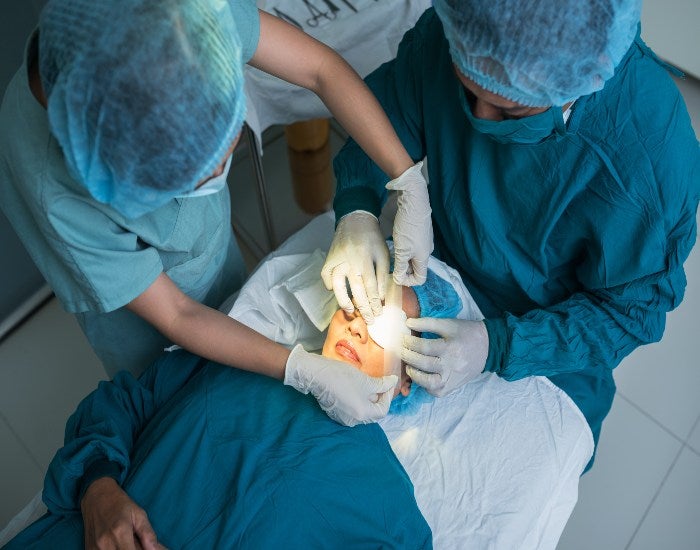Understanding Cataract Surgery: What You Need to Know

Have you noticed your vision getting blurrier over time? If so, cataracts might be the culprit. Understanding cataract surgery and its impact can help you make an informed decision about your eye health. Prepare for the procedure and improve your sight by taking the time to know everything you need to know about cataract surgery.
What is Cataract Surgery?
Cataract surgery is a common and safe procedure to remove the cloudy lens in the eye caused by cataracts, which are a buildup of protein that leads to cloudiness and impaired vision. This condition generally affects adults and seniors. The surgery involves replacing the cloudy lens with a clear artificial one, restoring vision clarity.
The surgery is typically performed on an outpatient basis, allowing you to go home the same day. Thanks to modern advancements, the procedure is swift and efficient, with most surgeries lasting less than an hour.
Signs You Need Cataract Surgery
Recognizing the signs of cataracts can help you determine whether surgery may be necessary. If you notice any of the following symptoms, it’s important to consult an eye specialist for evaluation:
- Blurry vision that does not improve with new glasses can be a sign of an underlying issue.
- Impaired night vision that makes it challenging to drive after dark or see in dimly lit areas.
- Colors that appear faded or less vibrant than usual.
- Increased sensitivity to glare and bright lights that cause discomfort when outdoors on sunny days or while driving at night.
- Seeing halos around lights.
- Double vision in one eye can also occur.
Types of Cataract Surgery
Various types of cataract surgery exist, each with unique techniques and benefits:
- Phacoemulsification: Most common method using ultrasound waves to break up and remove the clouded lens.
- Manual Extracapsular Cataract Surgery: Removes the lens in one piece, typically for advanced cataracts.
- Manual Small Incision Cataract Surgery: A variation that requires a smaller incision.
- Femtosecond Laser-Assisted Cataract Surgery: Utilizes laser technology for precise incisions and lens fragmentation.
- Intracapsular Cataract Surgery: Rarely used today; involves removing both the lens and surrounding capsule.
How to Prepare for Cataract Surgery
Thorough preparation can significantly impact your experience during cataract surgery. Begin with a preoperative examination, where your eye doctor will evaluate your eye health and explain the procedure in detail. It’s important to stop wearing contact lenses as recommended, allowing your eyes the necessary time to rest and heal before the surgery.
Discuss all medications with your doctor, as some may need to be temporarily halted prior to the procedure. You may also be required to fast for several hours beforehand, so adhere closely to your doctor’s guidelines. Lastly, arrange transportation for the day of the surgery, as you will not be able to drive yourself home afterward.
Cataract Surgery Procedure
During the cataract surgery, you’ll be awake but under local anesthesia to numb your eye. The surgeon will make a small incision in your eye to remove the cloudy lens. Depending on the technique, they may use ultrasound or laser to break up the lens before removal.
Once the lens is removed, an artificial lens is inserted in its place. You’ll likely feel some pressure during the procedure, but it shouldn’t be painful. Afterward, you’ll be monitored for a short time before being discharged to go home.
Cataract Surgery Side Effects
While cataract surgery is generally safe, be aware of potential side effects. You might experience mild discomfort, itching, or blurred vision following the procedure. These symptoms typically improve within a few days.
Some patients experience increased light sensitivity or see halos around lights temporarily. In rare cases, complications such as infection, bleeding, or increased eye pressure can occur. It’s important to follow post-operative care instructions and attend follow-up appointments for a smooth recovery.
Cataract Surgery Recovery
Recovery from cataract surgery is usually quick and straightforward. Most patients notice improved vision within a few days, but full recovery can take several weeks. Follow your doctor’s advice on using prescribed eye drops to prevent infection and reduce inflammation.
Avoid strenuous activities and heavy lifting during the initial recovery period. Protect your eyes from bright lights and wear sunglasses outdoors. Attend follow-up appointments to monitor your progress and discuss any concerns with your eye doctor.
Benefits of Getting Cataract Surgery
Cataract surgery provides a range of benefits, making it a valuable investment in your eye health. Here are some of the key advantages:
- Improved Vision: Experience clearer sight with more vibrant colors, allowing you to enjoy activities you may have previously avoided.
- Enhanced Night Vision: Gain better visibility in low-light conditions, boosting your confidence when driving or navigating dimly lit areas.
- Reduced Glare Sensitivity: Feel more comfortable in bright environments, which can make everyday activities easier.
- Enhanced Quality of Life: Engage in hobbies and daily tasks with greater ease and enjoyment.
- Lower Risk of Falls: Decrease the likelihood of accidents related to poor vision, particularly beneficial for seniors.
Ultimately, cataract surgery can restore your independence and contribute significantly to your overall well-being.
For more information or to schedule a consultation, contact Spindel Eye Associates in Derry, NH, and surrounding areas at (603) 434-4193.
RECENT POSTS
categories
- Uncategorized
- Eye Exams
- Lasik
- Spindel Eye Reviews
- Cataracts
- Dry Eyes
- Refractive Errors
- Infographic
- Glaucoma
- Macular Degeneration
- Ocular Diseases
- Pulsed Light Therapy
- IPL
- eye care
- eye health
- Eye irritation
- Eye Syndrome
- Eye Doctors
- Diabetes
- Contacts
- LASIK Surgery
- dry eye syndrome Manchester
- Glasses
- Vision Care
- LipiFlow
- Contact Lenses
- Astigmatism
- Crizal Prevencia
- Spindel Eye
- Children
- skin cancer
- Sunglasses
- Eye Disease
